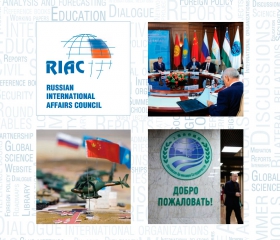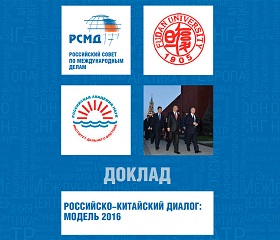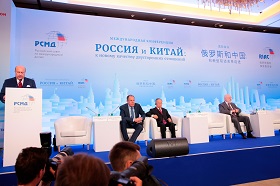In 2016, the Shanghai Cooperation Organization is celebrating its 15th anniversary. Currently, the organization seems to be going through a most critical stage of its development, expanding and at the same time searching for responses to new threats to peace and security. To discuss these and other matters, we met with SCO Secretary General Rashid Alimov on the sidelines of the conference "Russia-China: toward a New Quality of Bilateral Relations."
In 2016, the Shanghai Cooperation Organization is celebrating its 15th anniversary. Currently, the organization seems to be going through a most critical stage of its development, expanding and at the same time searching for responses to new threats to peace and security. To discuss these and other matters, we met with SCO Secretary General Rashid Alimov on the sidelines of the conference "Russia-China: toward a New Quality of Bilateral Relations."
This year the SCO is turning fifteen. How would you define its main achievement and current goals?
Now it seems absolutely clear that fifteen years ago the SCO members of today made a proper choice, setting an inspiring example for the global community on how to meritoriously deepen neighborly, friendly and partner relations to achieve practical results along the path of joint development.
By strictly observing the principles and provisions of the SCO Charter and the Agreement on Long-Term Neighborliness, Friendship and Cooperation, the member-states have built a solid basis for common action aimed at ensuring peace, security and stability, as well as multilateral interaction in political, economic, humanitarian and other areas within the SCO frontiers.
The organization is gaining regional and worldwide clout, transforming into a weighty factor in international relations. More and more members, observers and partner states are joining, and this means higher international standing.
As a result, the SCO agenda is also expanding, as its summits now cover both regional and global issues and issue documents devoted to strategic stability and global security. The SCO constructively contributes to the common counteraction to the new challenges and threats including terrorism, separatism, extremism, illegal traffic of narcotics and transboundary crime. Which I see most important, the SCO also promotes the dialogue of cultures and civilizations, bringing people closer to each other across its vast territory.
The SCO has successfully built a format of openness, trust and mutual respect in the very midst of the Eurasian region. The parties have demonstrated readiness to consolidate around the concept of joint security built on the principle of mutuality and rejection of confrontation, the predominance of common interests above individual aspirations. Still in effect is the declared refusal from the military force as a means for settling international conflicts.
Why is the organization expanding now? Is it due to new threats and challenges?
Of paramount significance were the SCO decisions taken at its 2015 summit in Ufa on the launch of the procedure for admission of India and Pakistan. The status of Belarus was elevated from partner to observer. More partners were invited, among them Azerbaijan, Armenia, Cambodia and Nepal. Thus, the group now incorporates 18 states and about 44 percent of the globe's population.
The SCO is a reputable international association attractive for many countries from the Middle East, South and Southeast Asia, and the Pacific. In fact, the SCO is by right a center of the emerging multipolar world with its own zone of responsibility, which is advancing in lockstep with time and in the same phase with the global pendulum.
Admission of such major states as India and Pakistan will considerably expand the SCO frontiers, opening more vistas for cooperation and offering a fresh approach to the solution of regional and global issues in view of the evolving broad initiatives in Eurasia and Asia-Pacific.
Why was it Russia that suggested affiliating Iran? And why now?
Russia is a founder and a vibrant actor, its role in the development and strengthening of the SCO being constitutive and highly principled. Moscow contributes healthily to the collaboration process, setting the organization's pace.
As you know, it was in the Russian city of Ufa that the SCO enlargement was launched, which was a novel phenomenon both for the organization and the aspirants, although we have a package of effective documents regulating admission and establishing a set of initial requirements.
Iran has been a vigorous observer for quite many years and officially applied to the SCO membership. The SCO documents specify that an aspiring state must be free of UN sanctions. Last year Tehran shed the burden literally one month after the Ufa summit and now fits all membership criteria. Hence, the member states have obtained every legal ground for processing Iran's application in compliance with the SCO norms. Besides, after the Ufa summit, India and Pakistan have prepared their memorandums of obligations for acquiring membership in close contact with representatives of the founding states. Iran may enter into negotiations only after the Council of Heads of Member States decides on launching the admission procedure.
Are there ways to step up the cooperation of member states in their counterterrorist efforts and interaction with the Collective Security Treaty Organization?
Closer cooperation with international organizations is a must, with the SCO now having formalized relations with the CIS, ASEAN, CSTO, Organization of Economic Cooperation, Conference on Interaction and Confidence-Building Measures in Asia, as well as the UNODC and ESCAP.
The SCO comes out for coordinated approaches to countering terrorism, interaction with international and regional organizations and partners of the SCO, as well as for co-working with countries in order to create conditions for expanded cooperation in fighting terrorism in the new reality.
The SCO states believe that the evil can be eradicated only through more intensive joint efforts aimed against both its symptoms and roots, as well as through consolidated action of the global community on the firm basis of international law and unified integrated approaches.
As far the CSTO is concerned, in 2007 the two organizations signed a memorandum of understanding that provides a firm foundation for combined work. Top figures of the CIS, CSTO and SCO regularly meet, with the most recent event held last fall in Moscow. By exchanging information and views on situation in Eurasia the three organizations obtain a better picture of the emerging challenges and security threats, and also take pinpointed decisions that account for the entire scope of factors.
Are you going to focus on economy or security in the near future?
The SCO has virtually completed the preparation of “The Action Plan on Implementation of the SCO development Strategy until 2025” approved by the organization’s foreign ministers at their session in Tashkent on May 23-24. This is a sort of a roadmap toward a much more effective SCO, implementation of steps on better cooperation for fighting the three evils and modern challenges and threats, as well as for the development of measures for promoting regional interaction and partnership, and cooperation in the cultural and humanitarian areas. And this is something that will form the backbone for member states’ near-term policies.
What is your impression of the conference "Russia-China: toward a New Quality of Bilateral Relations?" What ideas and proposals have you found most interesting?
The conference provided the platform for discussing both Russo-Chinese and Eurasia-wide issues at a very high political level, with the parties engaged in a very pragmatic and interests-oriented discussion, which means more attention toward the process on the Eurasian space.
Innovative ideas were plentiful, many of them to be definitely included into the everyday diplomatic activities.
Prepared for publication by RIAC Website Editor Maria Smekalova






